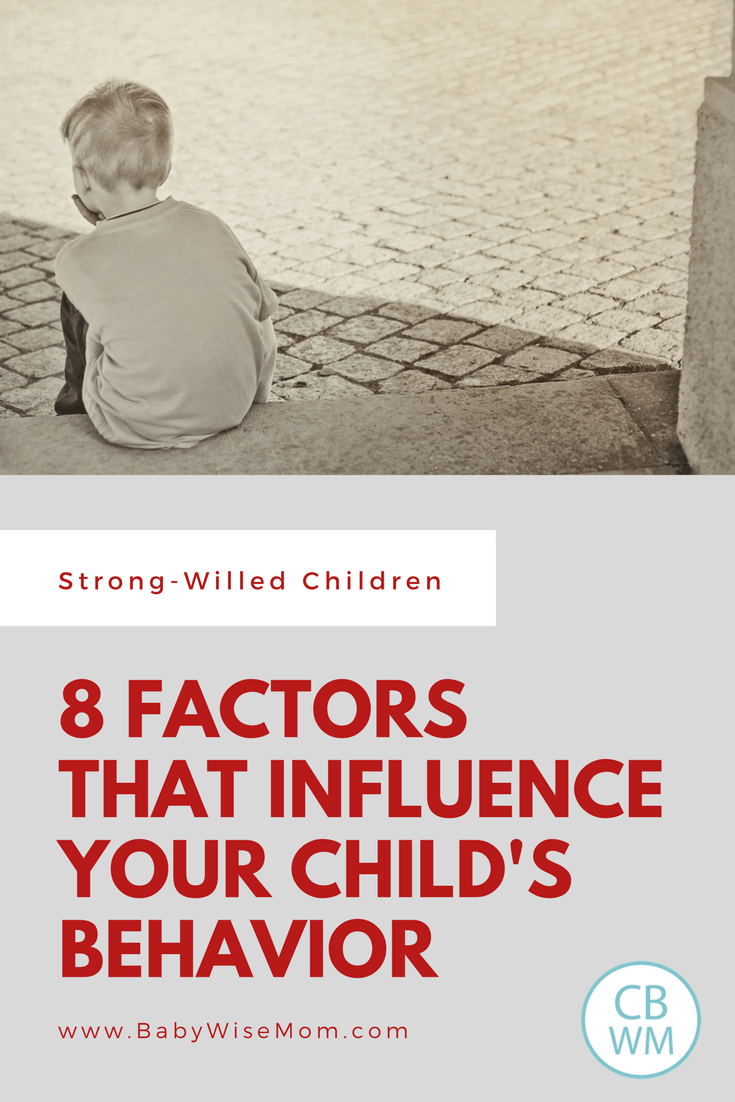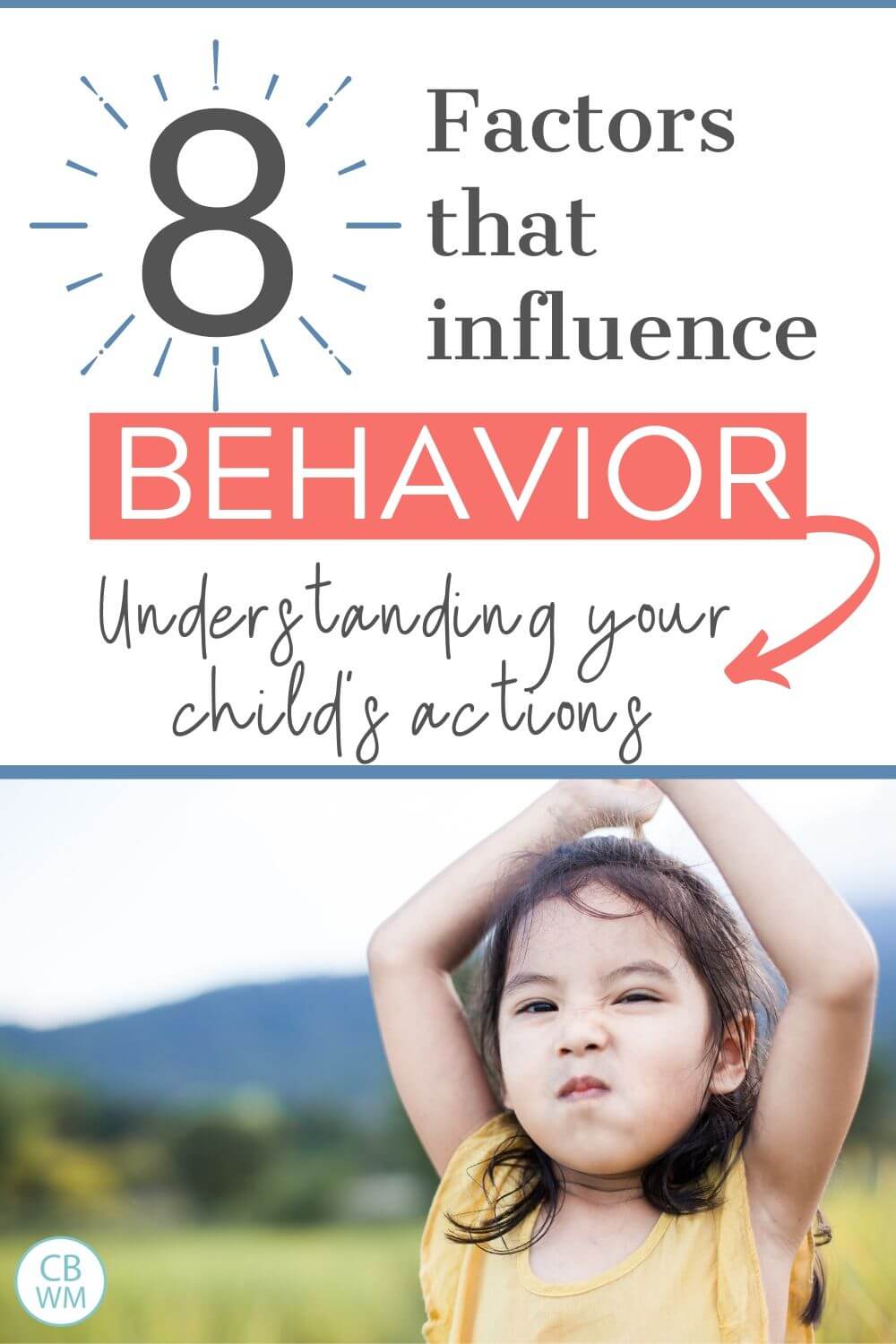The demeanor of your child isn’t simply the result of your parenting skills. There are other factors that will impact your child’s behavior.

Post Contents
Factors that Influence Behavior
In Parenting the Strong-Willed Child, Forehand and Long talk about the various factors that also influence your child’s behavior. Here they are:
Divorce
I have no experience with this, so I won’t pretend to talk about it. For more on their discussion and recommendations, see the book.
Remarriage
Again, no experience. See the book for more 🙂
Parental Conflict
(pages 33-34)
No experience…ha! Just kidding. We are human. Yes, you will disagree with your spouse. Yes, you will disagree with things your spouse does when your children are around. You are not the same person.
Even if you were the same person, you might disagree with each other because sometimes we have a conflict of what to do in our heads 🙂 So it is normal to disagree.
Read: Positive Communication in Marriage
Here are some tips from keeping parental conflict from creating behavior problems in your child–and take note that these rules do apply even if you are not married. These are rules for parental conflict, not married spouse conflict:
- Don’t argue in front of the child: This isn’t something that must NEVER happen. Sometimes it is beneficial to work things out in front of the child (see below), but major disagreements should not be in front of your child.
- Support parenting practices: Work together as parents no matter how mad you might be at the other person. When it comes to parenting, you are a team.
- Model conflict resolution: You don’t need to hide every conflict from your child. When it is not a major disagreement, you can use the opportunity to model appropriate conflict resolution for your child. It is a skill all people need. If you don’t know how to resolve conflict appropriately, learn. I will be posting on this at a later date. It is a real skill to learn. My minor is in communications, and we had an entire semester dedicated to learning conflict resolution skills.
- Maintain a good relationship with child: Don’t bring your child into the conflict. The disagreement is between you and your spouse. There is no reason for you to bring your child into it (at least not a good one). Yes, this applies if you are divorced.

Depressive Mood
Again, this is not something I have experience with as a parent. But of course, if a parent is depressed, it is going to affect the child. It also can affect how you perceive the actions of your child. See the book for more.
Physical Illness
(pages 35-36)
My closest experience with this is pregnancy. Since I am sick the entire time and I have been pregnant four times, I have lots of experiences with sickness 🙂 But it is sickness that I know the approximate ending date for–not a terminal illness or illness with an unknown time frame.
When you are sick, it can really tax your patience level. It naturally lessens your energy level and your tolerance. Here are some tips to help minimize the impact of the illness on your child(ren):
- Educate Yourself: Knowledge is power. Learn all you can.
- Evaluate Illness: Be honest with what impact this illness has on your parenting.
- Monitor Illness: Take note of what helps and what hurts. How much sleep do you need? Do you need a nap in the day? What are you like when you are hungry?
- Tell Your Child: Tell your child about your illness. Tell him the name of it, tell him what you feel like, tell him how long you will be sick and how it is treated, and tell him the outcome. But give as much hope as you can.
- Be Honest With How You Feel: Keep the family updated on how you feel. Are you feeling really sick that day? Let them know.
- Accept Help: Accept the offers for help from friends and family.
Alcohol Abuse
Again, not a topic I am familiar with. See the book for more.
Television
(pages 37-39)
I have written a post on TV in the past (see Television). I thought Forehand and Long made some excellent points on the topic. Here they are:
- Negative Impact: They point out that the problems with TV aren’t all about what the child is watching, but what the child isn’t doing while watching TV. This is something to consider. I know many parents closely monitor what their children watch on TV. I know I do. There are some great shows out there. But when your child is watching TV, your child isn’t interacting or playing. I think we need to be mindful of the generation of children we are raising. I have noticed teenagers are becoming more isolated as Internet chatting and texting are becoming popular. I watch teenagers sit right by each other and text people rather than talk to each other. We need to make sure our children learn how to interact with other people face to face.
- Watch Good Shows: This is obvious–only allow good programming. Know what they are watching.
- Not a Babysitter: The television should not be used as a babysitter on a regular basis. There will be times you need to have the children watch something on TV in order to get something important done, but don’t do this on a regular, daily basis. Since we moved, we have pretty much cut TV out of our day altogether. Kaitlyn watches 30 minutes three times a week and that is basically it. The kids don’t miss it. They play together instead. If your children don’t regularly turn to the TV for entertainment, they won’t need it. They will use their imaginations instead.
- Limit While Young: The idea of “start as you mean to go on” applies to television as much as sleep habits. It is especially important for the young because studies suggest it has negative impact on young children.
- Set Rules: Have rules about what shows can and cannot be watched and how much time can be spent each day watching TV. Stick to these rules.
- Be A Good Model: Don’t tell your child he can only watch TV for 30 minutes each day and then sit in front of it for two hours. Be a good model.
- Watch With Your Child: This is beneficial for many reasons. One is that if you watch with your child, you will know exactly what is in the show he is watching. Also, you can use the time to cuddle with your child. A third benefit is it can prevent you from abusing the television. If you sit with your child to watch TV, you will be less likely to let him watch it for an extended period because you will have other things you need to get done.

Peer Influence
I am just now starting to delve into the world of peers with Brayden (age four), so I don’t have a lot of experience to draw from. More to come as I get experience 🙂 But as some basics, be sure your child is comfortable with you. Be sure your child has the moral foundation taught before peers are more of an influence than you are. Encourage friendships with positive influences. Monitor the time your child spends with friends and limit the time spent with those who negatively impact your child’s behavior. Don’t criticize your child’s friends.
Conclusion
There are many factors that affect the behavior of your child other than just your consistency, encouragement, and punishment path. Take note of the things that create negative behavior in your child and work to minimize the impact of these factors.
